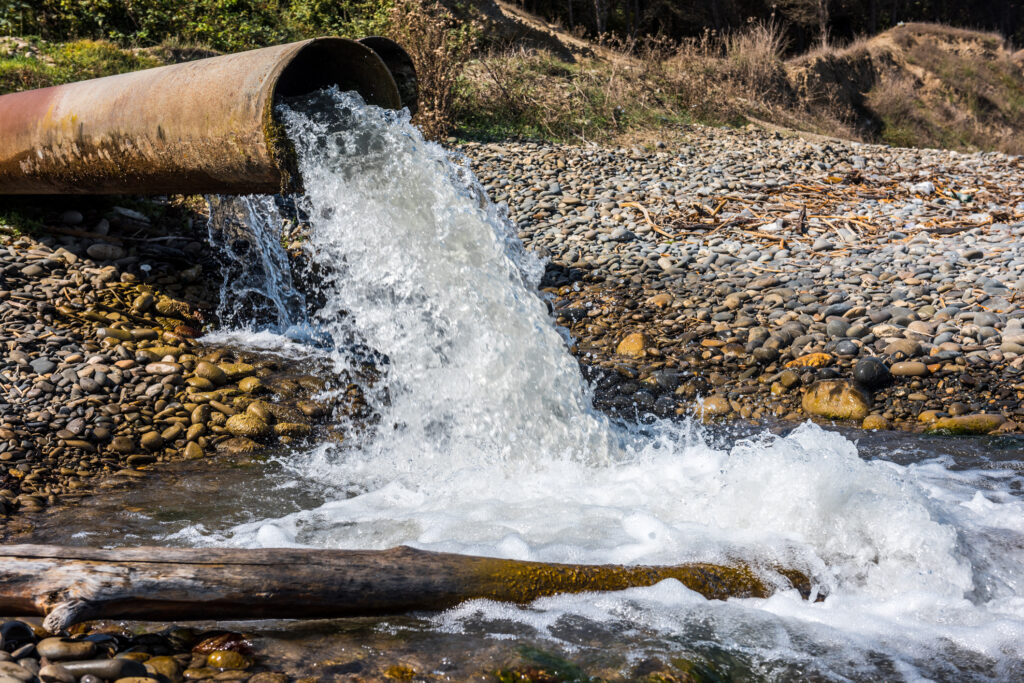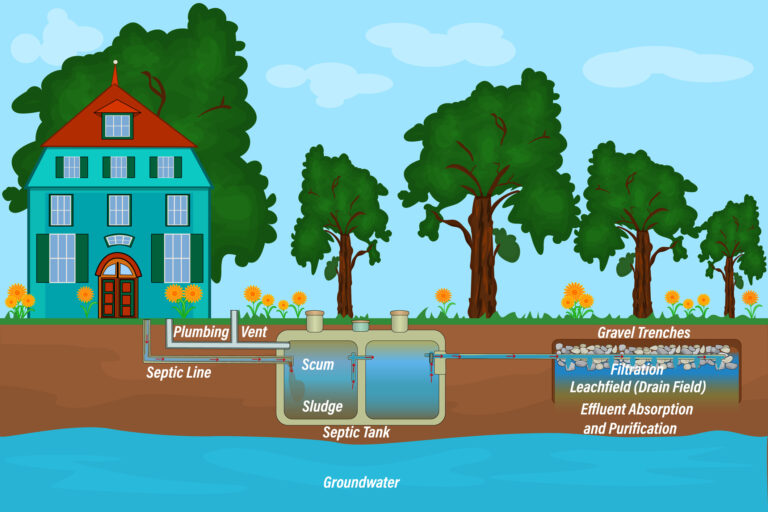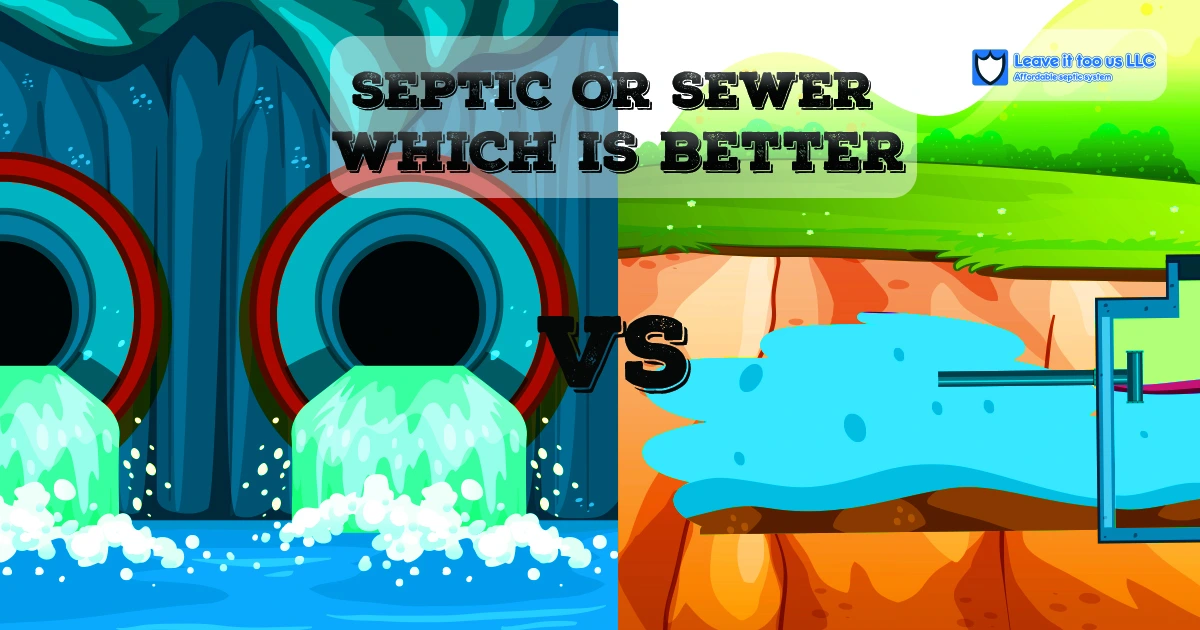If you live in a rural area or far from the city, a septic system is probably the only option you have to treat your sewage. However, if you reside in a populated neighborhood, your home must already be connected to your city’s sewer line.
But you know what? Sometimes, life gives you a chance to make your own choice.
Wondering how that might be possible?
Suppose your neighborhood decides to install a sewer line that connects with your municipal sewerage system. This is where you may be at liberty to either stick to a septic system or connect to a public sewer.
Being put in a situation like that, you just want to know the pros and cons of each system. Let’s dive in to help you make an informed decision and finally solve the mystery: septic or sewer which is better?
What’s the Core Difference Between Septic and Sewer Systems?
It’s really simple! The core difference between septic and sewer lies in the way they treat the wastewater. A septic system treats your waste separately at your site. It’s your responsibility to install and maintain your septic system.
Whereas in a public sewer system sewage goes into a centralized wastewater treatment plant. The local government is responsible for operating these treatment plants with taxes and fees.

Here is the catch: Even if you have a septic tank your local government might still charge you
Septic vs Sewer: Which One is Good for the Environment?

Without a doubt, environmental friendliness is a big concern when it comes to waste management. If properly cared for, a septic system stands out as a more eco-friendly option as compared to its counterpart. It doesn’t rely on the complex infrastructure that a city sewer requires.
Moreover, septic systems consume far less energy than municipal treatment plants as they use chemicals to get rid of sludge and remove wastewater pollutants.
Additionally, septic systems conserve your local water supply. Treated water is released into your lawns, which acts as a catalyst for nourishing your garden.
What Other Benefits Do Septic Systems Offer?
Yeah, septic systems are eco-friendly, but that’s not the only advantage they have. There are a number of other benefits that encourage you to install a septic system for your waste management. Let’s talk about a few of them:
You get to enjoy your freedom
“We need to contact our municipality because our sewer line is choked and backing up once again.” Sounds like a hassle, right? But that won’t be your concern once you install your own septic system.
It only drains your waste, not your wallets
Installing a septic system proves to be a more cost-effective solution compared to connecting to a city sewer. With an average cost of $3,900, including the tank ranging from $1,500 to $5,000, septic systems are a budget-friendly option for three- or four-bedroom homes.
In contrast, the installation of a new main sewer line averages $3,200, with potential additional costs ranging from $500 to $20,000 for city sewer hookup.
If you care, it stays for long
Opting for a septic system offers a durable, long-lasting solution, requiring rare replacements when properly installed and maintained. With careful consideration of what goes down the drains, these systems prove resilient over time, providing a reliable and enduring wastewater management solution.
There Are Still Drawbacks of Septic Systems
Since every rose has its thorn, septic systems also come with their unique problems. It might include tweaking your daily habits. These systems handle a limited amount of wastewater daily, requiring adjustments to bathroom and laundry routines to prevent overloading, especially during gatherings.
Harsh chemicals harm the system’s bacteria. So, while septic systems are effective, a bit of lifestyle awareness is part of the deal.
Other drawbacks might include:
Beware of frequent clogs
Septic systems tend to face frequent clogs, requiring careful disposal. Unlike city sewers, they struggle with some food waste and personal care products. Being mindful of what goes down the drains is crucial to avoid disruptions in the system.
You need to give it a proper attention
Septic tanks demand regular maintenance, typically needing pumping every 3–5 years and occasional cleaning when problems arise. Pumping involves removing scum and liquid to enhance the tank’s ecosystem. Cleaning, a more extensive process, resets the system, eliminating the sludge at the tank’s bottom for renewed efficiency.
So, Septic or Sewer? What Do We Actually Choose Then?
In the lively debate between septic or sewer which is better? The septic system takes the spotlight. It’s not just waste management; it’s an eco-friendly, budget-savvy, and durable solution. With the perks of autonomy and minimal upkeep, it’s like having your waste freedom.

While city sewers offer convenience, the occasional clogs and reliance on municipal setups make the septic charm hard to resist. For those seeking a sustainable, self-sufficient journey in waste management, the septic system is the hero of the story.
If You Need a Septic Service, Leave It Too Us!
Well, if you need to install a new septic system or repair an existing septic system, we’ve got you covered around the clock.
Contact us at 860-949-0108 or online to get a free quote now! Let’s handle your waste and get rid of sewage hassles now!


